Fascism in Sussex
Charles Bentinck Budd was born in Godstone, Surrey, on 16th August 1897. His father, Harry Bentinck Budd, had inherited a large fortune, but this had virtually disappeared by this time and his drunken behaviour had persuaded his mother to emigrate to Australia, leaving her son with an abusive father. (1)
At the age of sixteen he joined the Junior Division of an Officer's Training Corps in Salisbury. On the outbreak of the First World War he lied about his age to become a member of the 5th Dragoon Guards at the age of 16. (2)
He fought on the Western Front and was eventually commissioned as a Second Lieutenant in the Royal East Kent regiment. At the Battle of Loos in 1915 he was badly injured when he was hit by three machine-gun bullets, one of which lodged in his brain. Budd was invalided home with a silver plate in his skull and a severe disability pension. The secret files kept on Budd by the intelligence services suggested that this wound might have been responsible for his "unstable mental state". (3)
Charles Budd suffered paralysis of his right hand for the rest of his life. He also had intermittent bouts of blinding headaches and occasional loss of memory and found reading difficult. In 1918 he returned to France as an Acting Captain in the Labour Corps and was involved in the repair and maintenance of highways and bridges.
A strong opponent of the Russian Revolution he attempted to enlist in the White Army fighting the Red Army in Russia. When he was rejected on health grounds, he joined the Auxiliary Division of the Royal Ulster Constabulary, serving in Dublin. In 1921 he formed a company producing pressed steel. When this ended in failure he moved to Italy where he exported flowers to Britain. While in Italy he witnessed Benito Mussolini gaining power. In 1925 the British government commissioned Budd to write a report on the regime. (4)
Charles Bentinck Budd
In 1926 Budd moved to Worthing and lived at Greenville House in Grove Road. Budd was elected Vice President of the local branch of the British Legion. Shortly afterwards, on 31st March 1930, Budd, standing as an Independent, where he defeated a long-established Conservative councillor to the Offington Ward of the West Sussex County Council. (5) The new member showed great impatience with his fellow councillors and attacked the local council for not doing more for the unemployed. "On one occasion, when councillors were discussing road safety, he declared that all speeding restrictions should be abolished; why, he reasoned, should the young slow down for the old?" (6)
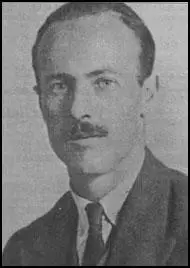
Budd also used the local newspaper, The Worthing Herald, to attack what he called "Red-hot Jazz", a new form of music from the United States. Budd expressed his racist views by describing it as "jungle music". (7) He also made an attack on the "moral character" of Arthur Vivian Stewart, a local councillor and a nurseryman of Westover Road, took Budd to court and in October, 1930, was awarded £1,000 damages for slander. (8)
Budd's biographer, Michael Payne, claims that he was described by various people as "dislikable, vain, excitable, prone to wild talk, unstable and with a mental outlook bordering on the pathological. All agreed, however, that his military bearing, coupled with his general appearance - he stood at six feet, with dark brown hair and moustache, and piercing blue eyes - belied his psychological problems and endowed him with charismatic force." (9)
British Union of Fascists in Worthing
At an election meeting in Broadwater on 16th October 1933, Charles Bentinck Budd revealed he had recently met Sir Oswald Mosley and had been convinced by his political arguments and was now a member of the British Union of Fascists (BUF). Budd added that if he was elected to the local council "you will probably see me walking about in a black shirt". (10)
Budd won the contest and the national press reported that Worthing was the first town in the country to elect a Fascist councillor. Worthing was now described as the "Munich of the South". Mosley now announced that Budd was the BUF Administration Officer for Sussex. Budd also caused uproar by wearing his black shirt to council meetings. (11)
On Friday 1st December 1933, the BUF held its first public meeting in Worthing in the Old Town Hall. According to one source: "It was crowded to capacity, with the several rows of seats normally reserved for municipal dignitaries and magistrates now occupied by forbidding, youthful men arrived in black Fascist uniforms, in company with several equally young women dressed in black blouses and grey skirts." (12)
The Labour Party in Worthing was very angry about the election of Budd and they passed a resolution with a view to forming a united opposition movement of the "liberal and democratic bodies of the town to meet on a common platform to combat the menace of Fascism". It was agreed to distribute anti-Fascist literature and propaganda and to link up with kindred organisations in order to form a nationwide front against Fascism." (13)
Frederick Clements organised a debate about fascism at the Worthing Christian Literary Institute on 3rd January, 1934. The speakers were Roy Nicholls, the chairman of the Young Socialist and W. J. Alfred, of the British Union of Fascists. Alfred argued that whether you like it or not, you will have fascism, for it is the next step in the social evolution to which you must come in your march of progress." (14)
Nicholas discussed the Fascist experiment in Italy and quoted figures that showed that the Italian workers were not being protected under the new regime. He argued that "Fascism is terrorism... Hitler believes in a narrow nationalistic spirit, and that means war". He pointed out that in fascist Italy, workers About a third of the people in the hall were fascists and constantly heckled Nicholls. Clements commented: "sought to make up their deficiencies of intellect by an excess of lung power." (15)
On 4th January, 1934, Budd reported that over 150 people in Worthing had joined the British Union of Fascists. Some of the new members were former communists but the greatest intake had come from increasingly disaffected Conservatives. The Weekly Fascist News described the growth in membership as "phenomenal" as a few months ago members could be counted on one's fingers, and now "hundreds of young men and women -.together with the many leading citizens of the town - now participated in its activities". (16)
A debate took place in January between Roy Nicholls a "Young Socialist" and a "Young Fascist" surnamed Alfred on the merits of fascism. The W reported that it was unimpressed the representative of the BUF: "Blackshirts always thunder - on the principle, apparently that if you say a thing often enough and lousy enough, people will believe it". On the other hand "the Socialists as a whole were extremely well-behaved". However, Nicholls had his faults: "Worthing's publicity seeking young socialist reminded me at times of a young rabbit, faced by the discerning eye of a hungry lion, who in the shape of Blackshirt Alfred made a consistent attack upon the noisy loquaciousness of his foe." (17)
Charles Budd also announced that local communists had broken into his offices at 27 Marine Parade and stolen 96 BUF badges, together with cigarettes and £2.2s.8d in cash. However, soon afterwards the police arrested Cyril Mitchell of 16 Leigh Road, Broadwater. Mitchell, who admitted the offence, was in fact a young Blackshirt, who had broken into the offices after a night out in the pub. He told the police, "something came over me… I had too much beer". (18)
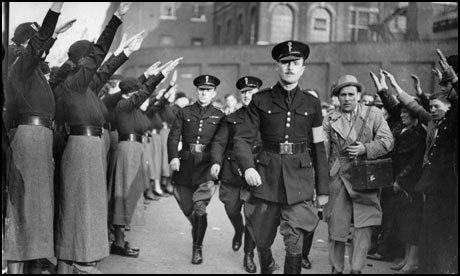
On 26th January, 1934, Budd and William Joyce, the deputy leader of the BUF, addressed a public meeting at the Worthing Pavilion Theatre. Over 900 people turned up to hear the men speak. As the audience went into the theatre, they were handed anti-fascist leaflets by Worthing Labour Party. There was some heckling by opponents of Joyce in the auditorium as Blackshirt stewards lurked menacingly in the background. (19)
Joyce said the objectives of the BUF included world peace, a classless society, abolition of the House of Lords to be replaced by a senate, a shorter working day and better education. In his speech Joyce claimed that the Conservative Party was riddled with snobbery and the Labour Party preached a doctrine of class hatred. This would change under Fascism where a perfect society would emerge in which class prejudice would cease to exist. Joyce pledged to free British industry from foreigners, "be they Hebrew or any other form of alien." He added: "The English are great people but they are lacking a leader." Joyce ended his two-hour speech with: "Reclaim what is your own in the fullness of Fascist victory!" (20)
The following week Budd took out an advertisement in the Worthing Gazette: "You have heard Professor Joyce on Fascism - Now Join. Fascism means: Freedom from class war. Assurance of fair play. Safety from exploitation. Continuity of responsible government. Individual freedom. Security of national defence. Modern progress: Apply BUF, 27 Marine Parade, Worthing." (21)
The mayor of Worthing, Harry Duffield, the leader of the Conservative Party in the town, was most favourably impressed with the Blackshirts and congratulated them on the disciplined way they had marched through the streets of Worthing. He reported that employers in the town had written to him giving their support for the British Union of Fascists. They had "no objection to their employees wearing the black shirt even at work; and such public spirited action on their part was much appreciated." (22)
A Worthing Anti-Fascist Committee was established in the town. John Robert Peryer, of Allendyne, 24 Offington Gardens, a maths teacher at the Worthing High School for Boys (WHSB) became one of the leaders of the group. Also involved was Charles Barber, Worthing's first Labour councillor, and his wife, Marion Barber. They also established the International Friendship League, an organisation attempting to "foster peace and harmony between groups of young people from a spectrum of European nations." Peryer's parents were themselves refugees and along with his wife Harriet Peryer, spent their adult life in promoting international friendship. (23)
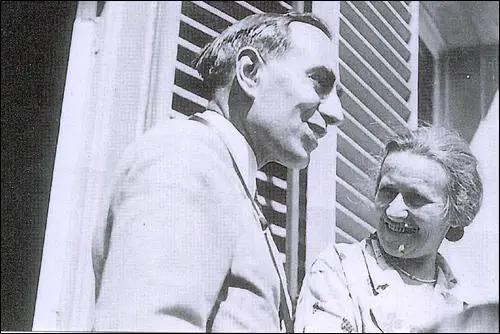
Charles Bentinck Budd gave an interview to the Worthing Journal, in November, 1933. "Fascism is the one thing that will save this country from the trouble for which it is heading! When I was put in charge of this area I was given to understand that I would find things slow in West Sussex; but now I find that people very eager and interested in our movement." (24)
Budd established branches of the BUF in Chichester, Bognor, Littlehampton, Burgess Hill, Rustington, Horsham, Petworth and Selsey. One of its most active members was John Sidney Crosland, the son of James Louis Crosland, the Vicar of Rustington, who also attended meetings. Crosland sold copies of the Blackshirt from the corner of Beach Road in Littlehampton and by early 1934 was selling 110 copies a week. Another active member was Jorian Jenks, a farmer from Angmering. (25)
It was arranged for Sir Oswald Mosley and William Joyce to address a meeting at the Worthing Pavilion Theatre on 9th October, 1934. The British Union of Fascists covered the town with posters with the words "Mosley Speaks", but during the night someone had altered the posters to read "Gasbag Mosley Speaks Tripe". It was later discovered that this had been done by Roy Nicholls, the chairman of the Young Socialists. (26)
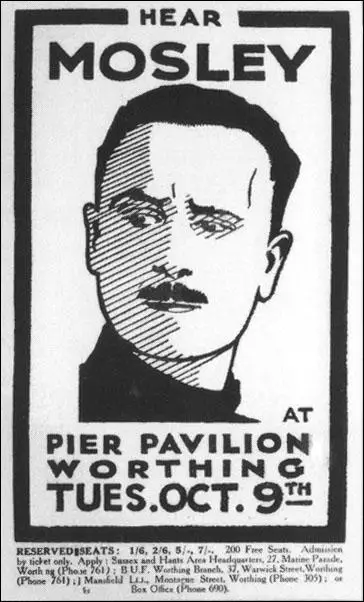
The venue was packed with fascist supporters from Sussex. Surprisingly they were willing to pay between 1s.6d and 7s. for their tickets. According to Michael Payne: "Finally the curtain rose to reveal Sir Oswald himself standing alone on the stage. Clad entirely in black, the great silver belt buckle gleaming, the right arm raised in the Fascist salute, he was spell-bindingly illuminated in the hushed, almost reverential atmosphere by the glare of spotlights from right, left and centre. A forest of black-sleeved arms immediately shot up to hail him." (27)
The meeting was disrupted when a few hecklers were ejected by hefty East End bouncers. Mosley, however, continued his speech undaunted, telling his audience that Britain's enemies would have to be deported: "We were assaulted by the vilest mob you ever saw in the streets of London - little East End Jews, straight from Poland. Are you really going to blame us for throwing them out?" (28)
At the close of proceedings Mosley and Joyce, accompanied by a large body of blackshirts, marched along the Esplanade.They were protected by all nineteen available members of the Borough's police force. The crowd of protesters, estimated as around 2,000 people, attempted to block their path. A ninety-six-year-old woman, Doreen Hodgkins, was struck on the head by a Blackshirt before being escorted away. When the Blackshirts retreated inside, the crowd began to chant: "Poor old Mosley's got the wind up!" (29)
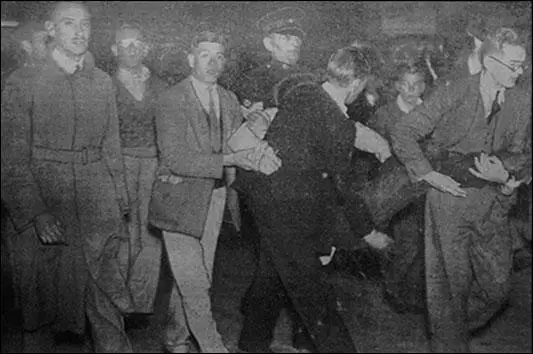
The Fascists went into Montague Street in an attempt to get to their headquarters in Anne Street. The author of Storm Tide: Worthing 1933-1939 (2008) has pointed out: "Sir Oswald, clearly out of countenance and feeling menaced, at once ordered his tough, battle-hardened bodyguards - all of imposing physique and, like their leader, towering over the policemen on duty - to close ranks and adopt their fighting stance which, unsurprisingly, as all were trained boxers, had been modelled on, and closely resembled, that of a prize fighter." (30)
Superintendent Clement Bristow later claimed that a crowd of about 400 people attempted to stop the Blackshirts from getting to their headquarters. Francis Skilton, a solicitor's clerk who had left his home at 30 Normandy Road to post a letter at the Central Post Office in Chapel Road, and got caught up in the fighting. A witness, John Birts, later told the police that Skilton had been "savagely attacked by at least three Blackshirts." (31)
According to The Evening Argus: "The fascists fought their way to Mitchell's Cafe and barricaded themselves inside as opponents smashed windows and threw tomatoes. As midnight loomed, they broke out and marched along South Street to Warwick Street. One woman bystander was punched in the face in what witnesses described as 'guerrilla warfare'. There were casualties on both sides as a 'seething, struggling mass of howling people' became engaged in running battles. People in nightclothes watched in amazement from bedroom windows overlooking the scene." (32)
The next day the police arrested Charles Budd, Oswald Mosley, William Joyce and Bernard Mullans and accused them of "with others unknown they did riotously assemble together against the peace". The court case took place on 14th November 1934. Charles Budd claimed that he telephoned the police three times on the day of the rally to warn them that he believed "trouble" had been planned for the event. A member of the Anti-Fascist New World Fellowship had told him that "we'll get you tonight". Budd had pleaded for police protection but only four men had turned up that night. He argued that there had been a conspiracy against the BUF that involved both the police and the Town Council.
Several witnesses gave evidence in favour of the BUF members. Eric Redwood - a barrister from Chiddingfield, that the trouble was caused by a gang of "trouble-seeking roughs" and that Budd, Mosley, Joyce and Mullans "acted with admirable restraint". Herbert Tuffnell, a retired District Commissioner of Uganda, also claimed that it was the anti-fascists who started the fighting. (33)
Joyce, in evidence, said that "any suggestion that they came down to Worthing to beat up the crowd was ridiculous in the highest degree. They were menaced and insulted by people in the crowd." Mullans claimed that told an anti-fascist demonstrator that he "should be ashamed for using insulting language in the presence of women". The man then hit in the eye and he retaliated by punching the man in the mouth. (34)
John Flowers, the prosecuting council told the jury that "if you come to the conclusion that there was an organised opposition by roughs and communists and others against the Fascists... that this brought about the violence and that the defendants and their followers were protecting themselves against violence, it will not be my duty to ask you to find them guilty." The jury agreed and all the men were found not guilty. (35)
Charles Bentinck Budd and Harry Jones
Late on New Year's Eve, 1934, Budd returned home to discover his wife and son had left him. A fellow fascist officer from Lancing informed Budd that she gone off with Harry Jones, a blackshirt from Horsham. Budd found Jones and producing a revolver, threatened to shoot him if he refused to reveal her whereabouts. A petrified Jones did so, and Budd warned him that if he "interfered between himself and his wife again" he would be killed. Jones reported the incident to the police and on 4th January, 1935 appeared before Horsham Magistrates Court. (36)
A local newspaper reported that Jones told the court: "About five weeks ago he was told there were differences between Budd and his wife. He saw Budd and his wife, and offered to act as mediator. Budd said he would not have anybody interfering with his private affairs. Mrs Budd had left her husband, but (Jones) was not at liberty to disclose where she had gone. Mr Jones told of occasions when he said he was threatened by Budd because he could not disclose Mrs Budd's address. On December 31, he said, he went with Budd in his car to the Old Forge House, Lancing. When they were inside a room Budd closed the door, and producing a revolver, said: "If you don't get my wife's address now, I will take you to a shed and shoot you like a dog... You are a disgrace to Fascism, and if it costs every penny I have, I will follow you to the end of the world, and get you in the end."
Budd, in the witness-box, denied using any threat. According to the newspaper report: "He (Budd) learned from Jones on December 19 that Mrs Budd had rung up Jones on the telephone from London. He heard Jones had been to London to see her, but Jones refused to disclose her address. Budd said he did not threaten Jones, but pointed out to him that he had been mixed up in other people's private affairs, in one of which he was beaten up by one of the men concerned. He (Budd) told him that if he interfered with his affairs he would probably get similar treatment." The case was dismissed through lack of evidence. (37)
Worthing and Nazi Germany
The monthly Worthing Journal was more hostile to Budd and the British Union of Fascists than most of the town's newspapers. In March 1935, it reported with pleasure the resignation of Superintendent Clement Bristow. It was seen by many as a consequence of his apparent sympathy for the fascist cause, for in court he had described fascists in the town as "very nice Worthing people". (38) A few months later it reported: "Fascism has come to Worthing, but Worthing has shown through its accredited representatives that it is not yet ready to submit to a Dictatorship." (39)
Charles Bentinck Budd continued to get support for the British Union of Fascists in the town. Lionel J. Redgrave Cripps, the Worthing architect, and his wife, spent three months in Nazi Germany in the summer of 1935. He commented that they were "simply amazed at the wonderful progress that has been made since we were last there five years ago." Cripps argued that "despondency and despair had been replaced by optimism, efficiency, unity, amazing energy and bursting vitality; the whole nation seemingly inspired with a new and great ideal in which all classes seemed genuinely to believe with the intensity of a religious fervour." (40)
Redgrave Cripps, was especially impressed with Hitler's Strength Through Joy programme. It was established as a subsidiary of the German Labour Front (DAF) on 27th November, 1933. It was an attempt to organize workers' leisure time rather than allow them to organize it for themselves, and therefore enable leisure to serve the interests of the government. Robert Ley, the leader of DAF, claimed that "workers were to gain strength for their work by experiencing joy in their leisure". (41)
In a letter to the Worthing Herald, Redgrave Cripps, argued: "The essentially constructive work done by Hitler in Germany during the very short period he has been in power is little short of miraculous. There is for instance, more practical Socialism for the actual workers and actually accomplished in Hitler's Strength Through Joy movement than anything that our English Labour Party has ever even dreamt of, let alone done. Also Hitler's wonderful new motorways are years ahead of our efforts in this direction. I only wish all my fellow countrymen in England could come here and see these wonderful constructive works for themselves... Germany today is a nation of young realists who believe in action rather than talk." (42)
R. G. Martin, the headmaster of Worthing High School for Boys, had originally been critical of the Budd's attempts to form a branch of the BUF in the town. At the annual dinner of the Old Azurian's Association, he said that he did not expect former pupils to join as they had "cold common sense among those who had the best education the town could offer." However, in August 1935, he controversially took a school party to Nazi Germany with their production of Shakespeare's Twelfth Night . On their return, Max Fuller, the head of WHSB's Dramatic Society, reported that in Germany "Hitler is looked upon as the saviour of the country." (43)
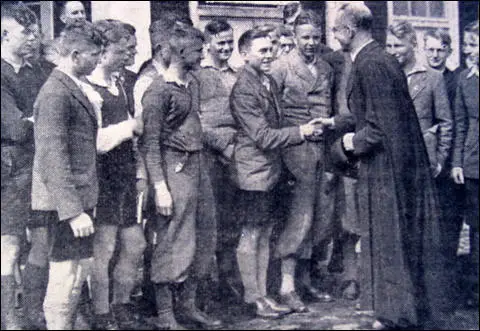
The following year Martin invited 17 members of the Hitler Youth to visit Worthing High School for Boys. They arrived in April 1936. (44) Martin commented that the German boys were a "sturdy lot and are far more burly than their English counterparts". That afternoon they put on a display of gymnastics that Martin described as "stunning". Although he added their imposing physiques they lacked, the suppleness of his boys. (45)
The local historian, Freddie Feest, argues: "It has since been well documented that there were ulterior motives for most such visits and that German youth with strong Nazi-influenced motivation were surreptitiously – though with various degrees of success and reliability – collecting information, documents and photographs during their tours that might prove invaluable when the time came for Nazi forces to carry out an invasion of that country." Feest suspects that the visit was arranged because members of staff were sympathetic to fascism: "So, had R. G. Martin been duped by the Nazi propaganda machine into believing such a visit was merely culturally inspired? Possibly. Certainly, according to several former pupils, their headmaster and at least one other teacher involved with the trip to Germany were greatly impressed by and demonstrably sympathetic to many of the Nazi ideals projected during the two-way visits." (46)
Charles Bentinck Budd was not a successful Administration Officer for the British Union of Fascists in Sussex. He argued with most of the senior officers in the organisation. One report suggested "Budd's amazing unpopularity in that town (Worthing), more members have left the Movement than are currently in the Branch." On 27th November 1935, having divorced his wife, Budd resigned his position in Sussex and moved to Birmingham. On 22nd June 1936, he was appointed BUF Inspecting Officer for the Midlands Area. A few months later he became the BUF Prospective Parliamentary candidate for Ladywood, Birmingham. (47)
James Louis Crosland and John Sidney Crosland
James Louis Crosland, the son of Walter John Crosland, a woolen cloth dresser, was born on 23rd September 1867 in Lockwood, Huddersfield. At the age of 24 he began training to become a Church of England clergyman at St Bee's Theological College in Cumberland. In 1892 he became curate of All Souls Church in Halifax. (48)
Crosland became friends with William Rawson Shaw. He was a member of the Liberal Party and was Justice of Peace for West Riding. He won the seat of Halifax in 1893, but disliked the job and resigned in 1897 and moved to Rustington where he built a new house called Allangate, after the family home in Halifax. (49)
After the death of his first wife, Letitia, in 1904, James Crosland was invited by Rawson Shaw to join him in Sussex. He used his influence to have him appointed as curate of St Mary's Church in East Preston. The local newspaper stated that "like his predecessors for some forty years he will live in Roundstone." (50)
In 1908 Crosland became vicar of St Peter and St Paul Church in Rustington. It was an unpopular decision with the churchwardens. Representations were made to Charles Ridgeway, the Bishop of Chichester to have Crosland removed but this was rejected. In 1909 the Churchwarden's accused Crosland of misappropriating funds from the Parish Poor Relief Fund. (51)
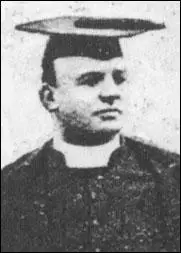
One of the Churchwardens of the Church, Mr. E. G. P. Wyatt, who was also Chairman of Rustington Parish Council, decided to bring a charge against Crosland, stated that "between April 20th 1908 and April 12th 1909, did fraudulently use for his own purposes, cash collected for the benefit of the sick and poor of the village." (52)
It was reported in the newspaper that the "Rev. James Louis Crosland, vicar of Rustington, accused of converting to his own use £16. 19s. from the church sick and poor fund, again appeared before the magistrates at Arundel on Saturday. The accused gave a complete denial to the allegations of the witnesses, and the Bench dismissed the case amid applause." (53)
On 27th September, 1910, Crosland married Constance Davidson, the 32-year-old daughter of George Walter Davidson, a rich and successful businessman. The family's wealth came from trading in the East Indies and were great supporters of the Conservative Party. According to the The Brighton Gazette: "The reception was held on Monday, at 167, Queen's Gate, and a large number of guests including many of the principal inhabitants of Rustington and the neighbourhood, were present. The wedding gifts to both bride and bridegroom were numerous and valuable." (54)
Constance gave birth to John Sidney Crosland on 17th October, 1911. The couple were both very interested in music and together they trained the local choir. During the First World War numerous fundraising concerts and other activities. The Littlehampton Observer reported: "A patriotic evening concert in aid of the Rustington War Emergency Fund took place in the Lamb Hall on Tuesday, and proved to be one of the most enjoyable entertainments of its kind ever held in the village." (55)
William Joyce was appointed as the BUF's full-time propaganda director. He was a close friend of the Crosland family and was often seen in Rustington: "John Sidney George Crosland and William Joyce were often to be seen, by very many local people, playing tennis together at one of the several tennis courts in Rustington, especially at the courts in Seafield Road... It seems that for some time none of the villagers knew we had one of the Blackshirt bases here in Rustington." (56)
James Louis Crosland and his son John Sydney Crosland established a branch of the BUF in Rustington. The headquarters was at 29 High Street. They held some of the meetings at Rustington Vicarage and John sold copies of The Blackshirt on the corner of Beach Road. One of John's early recruits was Commander Charles E. Hudson. According to Hudson's daughter. "In the early 1930's my father was already in his 60's when they met, John in his 20's... John was an enthusiastic Mosleyite and persuaded my father join and eventually became Leader for Sussex." (57)
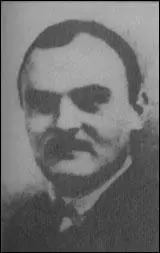
It was claimed that Rev. Crosland, as head of Rustington Church School, tried to influence the children into understanding and believing that Adolf Hitler was "trying to do what he could to make Europe a much better place and he should be admired and respected as a wonderful leader". In some cases, parents arranged for their children to go to school outside the village. (58)
John Sidney Crosland became the leader of the BUF in Rustington. He was also his father's warden at the church and served on the Rustington Parish Council. The BUF was especially strong in Sussex. A MI5 report stated: "Throughout the country the movement was well organized, led by enthusiastic persons and persistently active until the time the principal members were arrested... The Chief Constable estimated the number of adherents in Bognor as about 300.... Worthing membership was estimated to be about 60...As to the amount of activity, we know that the area was of sufficient importance of Mosley himself to speak at four meetings in recent times." (59)
The next day the police arrested Charles Bentinck Budd, Oswald Mosley, William Joyce and Bernard Mullans and accused them of "with others unknown they did riotously assemble together against the peace". The court case took place on 14th November 1934. Charles Budd claimed that he telephoned the police three times on the day of the rally to warn them that he believed "trouble" had been planned for the event. A member of the Anti-Fascist New World Fellowship had told him that "we'll get you tonight". Budd had pleaded for police protection but only four men had turned up that night. He argued that there had been a conspiracy against the BUF that involved both the police and the Town Council. (60)
James Louis Crosland gave evidence in support of Charles Bentinck Budd, Oswald Mosley, William Joyce and Bernard Mullans in November, 1934 . The Worthing Gazette reported: "The Rev. James Louis Crosland, Vicar of Rustington, said he was a non-active member of the British Union of Fascists. He described the crowd as acting in rather a threatening attitude and said he had to force his way through them." Eric Neve (the counsel for the prosecution) asked Crosland if he supported Fascist policy. He replied: "If it came to be a choice between that and something worse I should probably choose it." (61)
John Flowers, the prosecuting council told the jury that "if you come to the conclusion that there was an organised opposition by roughs and communists and others against the Fascists... that this brought about the violence and that the defendants and their followers were protecting themselves against violence, it will not be my duty to ask you to find them guilty." The jury agreed and all the men were found not guilty. (62)
James Louis Crosland wrote to Adolf Hitler in April 1936. The staff of Rustington Church School were asked to sign the letter before it was sent to Germany: "In order that you may be able to fully understand the attitude of the British people towards the proposals put forward by the German Government, we the undersigned take this opportunity as representative of public opinion, to write and express our full approval of the proposals, and also our deep sympathy and understanding for the German people in their sincere effort to bring a lasting peace to the disturbed and troubled continent of Europe. We feel that the proposals contain in themselves the essence of a plan which could bring a new order of civilization undreamt of in the annals of history and which would once and for all establish the peace of Europe on a solid and lasting foundation."
The letter went on to say: "We sympathise with the German nation in their struggle for equal status with the other great nations of Europe, and we realise that a country with so high a culture, which has contributed so much in the field of music, science, and art, should find a worthy and honoured place in the community of nations. We realise the work that your Excellency has done for Germany in particular, and for Europe as a whole is driving the menace of Communism from our midst, and we desire above all a friendship with Germany and the German people. We firmly reject the proposed Staff talks as monstrous, they are entirely out of sympathy with the feelings of the British nation, and we accord our warmest approval action of the German Government in their re-militarisation of the Rhine zone as a counter measure to the Franco-Soviet Pact." (63)
Miss Boniface, headmistress of East Street Girls' School, in Littlehampton, and district representative to the County Education Board, later recalled that in 1936 she was contacted by a teacher at Rustington Church School that Rev. Crosland had been circulating this letter to Hitler to the staff and asking them to sign it. Miss Boniface told the teacher that on no account should the staff give their signatures to such a document. (64)
Rev. Crosland continued to be a supporter of the British Union of Fascists. In 1938 he arranged for his son, John Sidney Crosland, and William Joyce, wearing their blackshirt uniforms, to lecture to the children. "It seems the objective was to introduce the young minds and bodies to a militaristic routine at an early age, in order to prepare them for the struggle for power in the war which was to come." (65)
Jorian Jenks
Jorian Jenks, the son of Edward Jenks and Dorothy Forwood Jenks, was born in Oxford in 1899. At the time of his birth he reader in English law in the University of Oxford and was also the author of several important books on politics and law. (66)
Jenks was educated at the Harper Adams Agricultural College and Balliol College, whilst he also served in the First World War. Over the next few years he "travelled to New Zealand, Canada and Australia working, studying and lecturing, and gaining valuable experience in land management and soil erosion". (67)
Jenks returned to England and became an active member of the Rural Reconstruction Association. Jenks claimed that Britain needed to "repeople the land" and to encourage the "small working farmer", while making "every method of modern science available to British agriculture". (68)
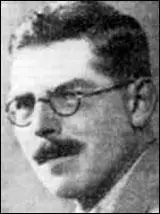
Jenks purchased his own farm in Angmering, West Sussex. He suffered considerable economic problems running his farm. A decade of falling prices had caused bankruptcies among farmers and extensive sales of land at low prices. For example, between 1929 and 1931 the price of wheat dropped by 50 per cent and that of beef by 30 per cent. (69)
Influenced by his own business experiences, Jorian Jenks became a "critic of this modern economy". Jenks was regulator contributor to Action under the pseudonym "Vergillius" and was the agricultural advisor to the party. He organised garden parties to raise funds for the BUF, a fairly common technique amongst the party's more affluent and rural supporters. (70)
Chris Hare argues: "Jorian Jenks was attracted to fascism because of its policy of self-sufficiency - the 'autarky' of the German Nazis. He saw industrialization and urbanization as corrosive developments that were alienating people from a natural way of living and their true inheritance - the land... Unfortunately, he also pointed the figure of blame at 'Jewish financiers' and increasingly, as the 30s progressed, aligned himself with the anti-Jewish policies of Nazi Germany." (71)
Jenks led the attack on Walter Elliott, the Minister for Agriculture. Each week a specific grievance was highlighted in Jenks' "Farmer's Diary". This included imports of lamb, bacon and fruit. He also attacked Elliott for continuing to give subsidies on imported beef. The Potato Marketing Board was also criticized for advising farmers to be cautious over planting, even though potatoes were still being imported. (72)
Jenks and the BUF also condemned those chain stores that were under foreign ownership and were responsible for huge imports of goods produced by cheap foreign labour. As Martin Pugh points out this included: "Marks & Spencer and Montagu Burton as Jewish, Woolworths as American, Unilever as Jewish-Dutch, and the Vesty Meat Trust for dealing in Argentine beef, not to mention Sainsbury, Liptons, Boots and Timothy Whites... All these combines were condemned for crushing small shopkeepers by means of bulk purchases, price-cutting, and bullying the producers into giving large discounts." (73)
Jorian Jenks became the most important figures in Sussex. An MI5 report stated: "Throughout the country the movement was well organised, led by enthusiastic persons and persistently active until the time the principal members were arrested... The Chief Constable estimated the number of adherents in Bognor as about 300.... Worthing membership was estimated to be about 60...As to the amount of activity, we know that the area was of sufficient importance of Mosley himself to speak at four meetings in recent times." (74)
Jorian Jenks and Oswald Mosley joined forces to speak at Worthing Town Hall in March, 1937. At the meeting Jenks was announced as the BUF candidate for Horsham and Worthing at the next election. The Worthing Journal accused Mosley of "bellowing", and thought Jenks was a poor speaker. However, he did not doubt he was "a very nice fellow", who should be thanked for giving permission for a part of his land to be excavated by archaeologists looking for the remains of the Angmering Roman villa. (75)
In December, 1938, John Becket and Gerard Wallop, 9th Earl of Portsmouth, launched the Fascist and anti-Semitic journal, New Pioneer. Jorian Jenks began one of the magazines main writers and wrote several articles on organic husbandry. Others who contributed to the journal included Major General John Fuller, A. K. Chesterton, Edmund Blunden, Arthur Bryant, H. J. Massingham, Rolf Gardiner, Reginald Dorman-Smith and Anthony Ludovici. (76)
Jenks published Spring Comes Again in 1939. In the book he argued "for sustainable production, organic farming and small localised economies. He believed that artificial fertilisers were causing cancers and killing wildlife and the international trade in food, far from being a way of providing cheaper products, was a trap, impoverishing producers and depriving customers of real choice." (77)
It has been suggested that had "Jorian Jenks not have had associations with the British Union of Fascists, he may well have been regarded today as father of the Green Party. Notwithstanding that, he nevertheless influenced many people with his views on organic farming and good husbandry." (78)
Charles Edward Hudson
Charles Edward Hudson was born in 1874. He joined the British Navy and reached the rank of Lieutenant-Commander. (79)
In 1907 Major Vernon Kell become Director of the Home Section of the Secret Service Bureau with responsibility for investigating espionage, sabotage and subversion within and without Britain. (80)
In 1911, a new section, headed by Captain Mansfield Cumming, became responsible for for secret operations outside Britain. In 1916 he appointed Hudson as the Copenhagen bureau chief. He used the cover of being a passport control officer. (81)
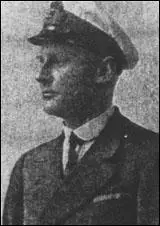
After retiring from British Naval Intelligence he married Alma Derrington Bell. The couple moved to Arnen, Limmer Lane, Felpham. Over the next few years Alma gave birth to three children. (82) In 1921 he was a founder member of the British Legion, a charity providing financial, social and emotional support to members and veterans of the British Armed Forces, their families and dependants. (83) Hudson had a senior post for the Dunlop Rubber Company. A member of the Conservative Party he became a local councillor and Vice Chairman of Felpham Council. (84)
Hudson also joined the Anglo-German Fellowship (AGF). It was formed following a speech by Prince of Wales that called for a closer understanding of Germany in order to safeguard peace in Europe. Sir Thomas Moore, the Conservative Party MP, responded by suggested setting up a study group of pro-German MPs. It was then decided to open it up to those outside the House of Commons and the AGF was established in September 1935 with Wilfrid Ashley (Lord Mount Temple), the former government minister, as chairman and historian Philip Conwell-Evans and merchant banker Ernest Tennant as secretaries. (85)
The Anglo-German Fellowship was aimed, above all, at the rich and powerful. It proudly and publicly claimed among its members, fifty members of both Houses of Parliament, three directors of the Bank of England, and "many generals, admirals, bishops and bankers". It also had a close relationship with several important Nazi leaders. This included Joachim von Ribbentrop, Rudolf Hess and General Werner von Blomberg. The pro-Nazi press baron, Harold Harmsworth, 1st Lord Rothermere, arranged for Ernest Tennant, the leader of AGF, to meet Adolf Hitler, Konstantin von Neurath, Joseph Goebbels, and Hermann Goering. (86)
During the 1930s, many visitors were invited to have dinner with the Hudson family, this included Oswald Mosley, William Joyce, Jorian Jenks and Charles Bentinck Budd. Alma Hudson became the Women's District Leader for Bognor Regis. Her sister, Doreen Bell, was one of the organization's national speakers and was married to Archibald Findlay, the BUF's Director of Public Relations. (87)
Hudson's daughter later commented: "In 1934 my father joined the British Union of Fascists, and my mother followed, with my father soon becoming leader in Sussex, as well as a parliamentary candidate. My siblings - a sister, brother and I aged ten, nine and seven respectively, joined in the excitement. Oswald Mosley came to dinner, we painted slogans on street walls, raised our arms in Nazi salute, shouted PJ (perish the Jews), and sang Giovinezza - an Italian Fascist song." (88)
Hudson also worked closely with Norah Elam, a former leading figure in the Women's Social and Political Union (WSPU), who living in Northchapel, near Chichester, who had been appointed as BUF County Women's Officer for West Sussex. In November, 1935, Hudson and Elam arranged for John Beckett to make a speech in Northchapel explaining why the BUF was not taking part in the 1935 General Election. Hudson then led a march of around 100 Blackshirts under the banner, "Fascism Next Time." (89)
A secret police report on Fascism in Sussex claimed that "Commander Hudson... was the leading man in West Sussex, although he was energetically supported by a number of able subordinates. Working in close co-operation with him as Regional Inspector of the whole of Sussex was J.S.G. Crosland... The Chief Constable estimated the number of adherents in Bognor as about 300." (90)
The police report recorded that Hudson was one of the most important BUF speakers in Sussex. On Sunday, 20th February, 1938, Hudson and Mosley both spoke at the Theatre Royal in Bognor Regis. In a speech made at the British Legion, he supported the appeasement policies of Neville Chamberlain as he thought Britain should do everything in order to avoid war: "Today we are hearing the drums of war. They are beating throughout Europe... How can our people forget the millions of men who sacrificed their lives in the last war? Those men who today are resting under the poppies of Flanders through to us the torch which we were to carry and to live up to for their great sacrifice." (91)
In April 1939 Charles E. Hudson shared a platform with Jorian Jenks in Bognor Regis to explain how the British Union of Fascists planned "to construct a self-sufficient economic unit" in agriculture. "Jenks explained how the Fascist plan of an agricultural corporation to manage the industry, and to be representative of the industry from the farmer and the farm labourer to the housewife and the consumer, was expected to achieve the economic price and the assured market." (92)
The British Union of Fascists had developed a reputation for racism. Mosley had adopted a long-term electoral strategy of supporting anti-Semitic campaigns in Jewish areas. Jewish hecklers at Fascist meetings had been badly beaten up. The two men were both questioned about the Fascist attitude to the Jews, and Jenks argued "the Jews were aliens to this country, and as guests, were expected to achieve the standard of behaviour set up in this country". If they failed to do this "they would be deported". (93)
Internment
The Second World War began on 3rd September, 1939. The following year Winston Churchill became prime minister, and warned that a German invasion was imminent and announced the imposition of Defence Regulation 18B. This legislation, passed on 22nd May, 1940, gave the Home Secretary the right to imprison without trial anybody he believed likely to "endanger the safety of the realm". Over the next few weeks 1,769 British subjects were interned of whom 763 had been members of the British Union of Fascists. (94)
Of the fascists British fascists arrested over 600 came from Sussex. (95) This included Charles and Alma Hudson. John Sidney Crosland, Charles Bentinck Budd, and Norah Elam were also arrested. A government report pointed out: "The internment of the persons whose cases have come before the Committee or whose cases are sent herewith has done much to stamp out Fascist activity in West Sussex, but it is evident that there are still fascist sympathizers and that the return of any of their Leaders might well cause a recrudescence of their activities." (96)
This was a very difficult time for the Hudson family. Their daughter commented, "both my parents were interned under Regulation 18B – my mother on 30 May and my father two weeks later. He spent three and a half years on the Isle of Man, whilst my mother had nine months in Holloway, with neither of them ever being charged. In the meantime we children had stones thrown at us and felt orphaned." (97) Hudson continued to have authority in the British Union of Fascists and while at the Huyton Internment Camp he was elected as Camp Leader. (98)
When John Sidney Crosland was arrested the police reported: "Among his property was found: (i) Two photographs of Hitler; (ii) Complete Fascist uniform; (iii) Nazi Badge; (iv) Large quantity of Fascist literature; (v) Hand drawn map of East Sussex (where recent bombing raids have taken place)." It was feared that he was sending information to Germany and the report concluded that "the Chief Constable of West Sussex regards Crosland as a very dangerous person." (99)
When the police searched Crosland's home they found a great deal of Nazi literature. On the back of one of the photographs of Adolf Hitler was written: "Dear Sidney, I hope you will enjoy this picture of your beloved Hitler." He also had documents that gave German wavelengths and and times of foreign broadcasts. There was also letters that suggested that as late as August 1939 he intended to travel to Germany by motor car. (100)
In a letter to the General Accident Fire & Life Association he wrote: "I shall be leaving by the night boat from Dover to Ostend on Friday 1st September, next, I should be glad if you will kindly hold me covered for one month's touring in these countries. I have to inform you that there will be two drivers, myself and Commander Hudson of Limmer Lane, Felpham, near Bognor-Regis, Sussex, but I understand my Policy covers any number of qualified drivers." (101)
The authorities considered the possibility that Crosland and Hudson had been providing information to the Nazi government and that they were planning to flee to Nazi Germany. This is what William Joyce had done on the 26th August and by 18th September, he had began broadcasting in the Reichsrundfunk's English-language service, initially as a newsreader. Within a few years he had become Germany's principal English-language broadcaster and became known as "Lord Haw-Haw". (102)
Rev. James Louis Crosland was not interned but he was forced to resign. He left Rustington and went to live at The Priory in Cross-in-Hand. (103) Some historians have been surprised the Rev. Crosland was not interned. A government report pointed out: "The internment of the persons whose cases have come before the Committee or whose cases are sent herewith has done much to stamp out Fascist activity in West Sussex, but it is evident that there are still fascist sympathizers and that the return of any of their Leaders might well cause a recrudescence of their activities." (104)
John Sidney Crosland and Commander Charles E. Hudson served their sentence at the Huyton Internment Camp on the Isle of Man. According to Hudson's daughter, Crosland and Hudson were treated very well and shared their own house with two German prisoners of war as servants. (105)
Rev. Crosland pleaded for his son's release: "My wide experience in life has taught me this fact - no accused person is able to defend himself adequately in a trial against lies which are in circulation about him. He may deny them, but that is not enough.... But I appeal on higher reasons than that. I put it to you. Here am I an old man broken in health physically incapable of looking after my son's farm of 16 acres, would it not be more advantageous to the State and welfare of our country's need in this time of great danger to release him so that he could do something towards the production of food, provided that he abstained from all politics during the war and that he was under the supervision of the East Sussex Police?" (106)
John Sidney Crosland was eventually released on 21st August, 1941. He went to live with his parents and took over the running of the farm. The Chief Constable of East Sussex reported on 17th May 1942, to the Home Office, that he was "working extremely hard and seems to have put his heart and soul into the work he has undertaken and suggested that consideration be given to the question of revoking the restriction order." (107)
In 1946 Jorian Jenks joined forces with Lady Eve Balfour to establish the Soil Association. The catalyst was the publication of Balfour's The Living Soil (1943). According to the Soil Association: "The book presented the case for an alternative, sustainable approach to agriculture that has since become known as organic farming." Jenks became editor of the organization's journal Mother Earth. During the late 1940s the Association involved far-right and even anti Semitic elements, remnants of the defunct BUF, and was driven by far-right political ideas as much as ecological concerns. (108)
